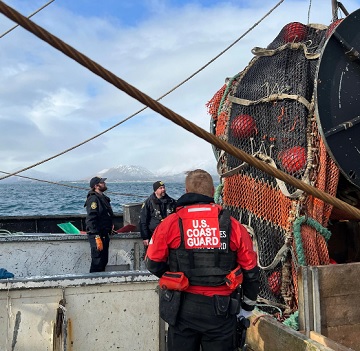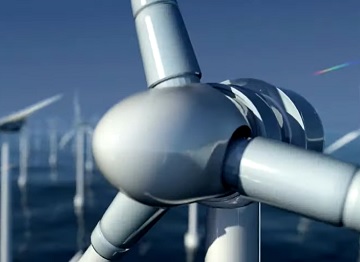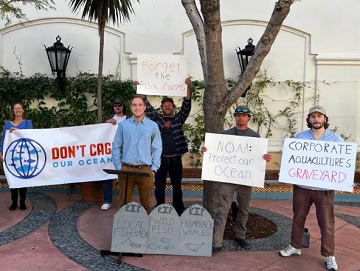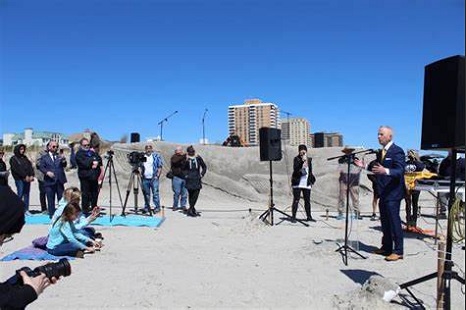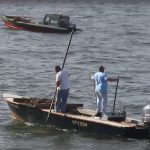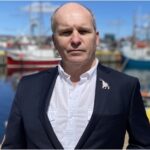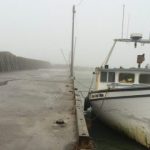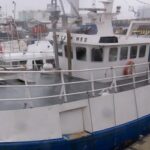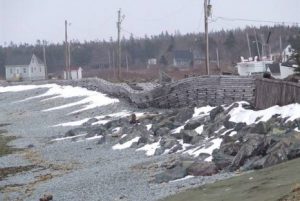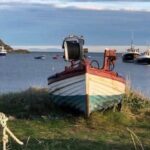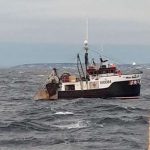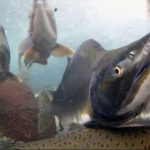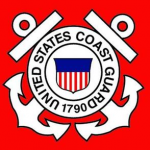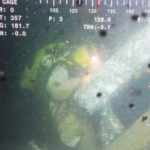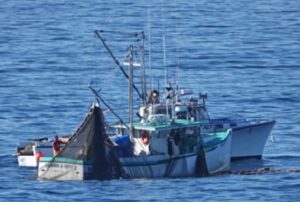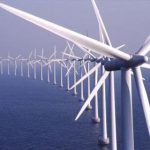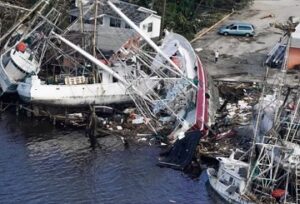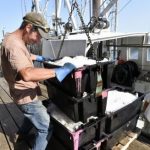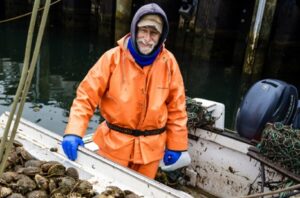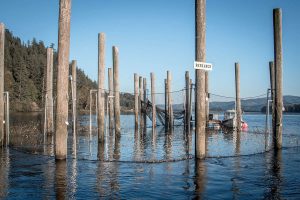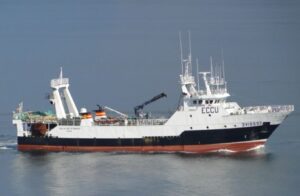Standing next to a 30-square-foot sand drawing of a humpback whale and her calf, U.S. Rep. Jeff Van Drew and other speakers made a call to “save the whales” Sunday afternoon. Van Drew, R-2nd, and state Sen. Vince Polistina, R-Atlantic, headlined a half-dozen speakers who once again opposed proposals for wind turbines off the coast of New Jersey and other Eastern states, claiming the sonar testing has led to a rise in marine mammal deaths over the past four months. They spoke to about 500 people on the beach at Suffolk Avenue. “Those whales — and I don’t mean to sound corny — were a divine blessing from God to wake us the hell up and say we’ve got to do something. This is the real thing. We are really in trouble with this and we’ve got to fight,” Van Drew said. Video, and a pile of photos! >click to read< 21:22
Tag Archives: NOAA
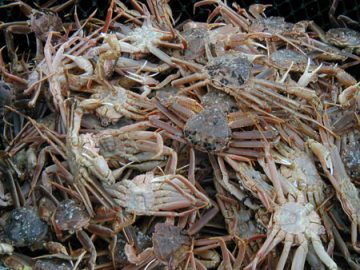
Disaster aid has arrived, but Western Alaska’s salmon and crab problems continue
The Alaska congressional delegation announced on Friday that the U.S. Commerce Department released the disaster aid. The money is to go to harvesters, processors and communities affected by designated disasters in salmon and crab fisheries that occurred between 2020 and 2022. For Bering Sea snow crab, signs are that the problems that led to the first-ever harvest closure, which was announced last October, will last for years. The National Oceanic and Atmospheric Administration Fisheries Service 2022 survey found that despite the emergence of cooler and more normal temperatures, mature male snow crab abundance was the lowest on record and mature female snow crab abundance was the third lowest on record. >click to read< 10:12
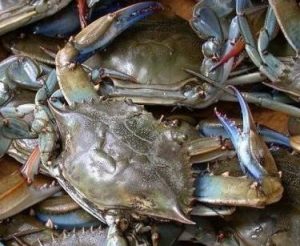
Chesapeake Bay blue crab population improves after all-time low in 2022
This year, the number of spawning age female crabs and adult male crabs both increased substantially, but the number of juvenile crabs only increased by about 15%, according to the winter dredge survey, which is completed from December to March by the Maryland Department of Natural Resources and the Virginia Institute of Marine Science. “We are encouraged by the increases in adult crab abundance, but we need to be vigilant given the ongoing low recruitment numbers,” said Lynn Fegley, acting director for Maryland Department of Natural Resources’s Fishing and Boating Services, in a statement. “We haven’t seen a strong year class since 2019 despite maintaining the spawning stock at a level capable of producing one.” Video, >click to read< 12:56
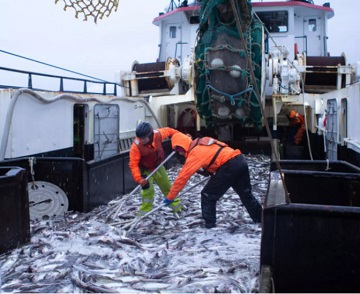
‘A’ season pollock quota back on par after decrease last season
Bering Sea pollock fishermen have almost met their “A” season quota. Since the fishery opened in late January, nearly 100 vessels have caught about 1.2 billion pounds of Alaska pollock. That leaves about 43 million pounds still available to catch. “It’s definitely a lot of fish,” said Krista Milani, a fisheries resources management specialist with the National Oceanic and Atmospheric Administration in Unalaska. “Sometimes when you think about the amount of pollock that they’re able to sustain in the Bering Sea, it’s kind of mind-blowing how much pollock is actually there.” According to NOAA, fishery managers were dealing with data gaps stemming from the COVID-19 pandemic. A population survey also came back lower than expected. “A” season ends June 10 — the same day “B” season starts. >click to read< 11:04
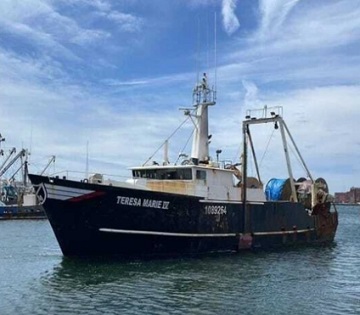
Environmental Regulations and Wind Turbines Are Backing New England Fishermen into a Corner
Just three weeks ago, Jerry Leeman was a commercial fishing captain in New England and a very successful one at that. Now, as executive director of the newly formed New England Fishermen Stewardship Association, he’s leading the charge against Biden administration policies that threaten the industry he loves, including overregulation and wind-turbine development in the Gulf of Maine. Leeman said that he and fellow New England fishermen have serious concerns about the accuracy of the NOAA data. Fish-population assessments fell to the wayside during the Covid years — 2021 and 2022 — and the data-collection process has not yet been corrected. “Whether you’re a lobsterman or a ground fisherman, a trend up and down the coast here is that nobody wants wind turbines placed in our environment. It’s going to mess up our stocks and our species. Not to mention it’s going to change the viability for generations to come in the fishing grounds,” Leeman said. Photos, >click to read< 07:51
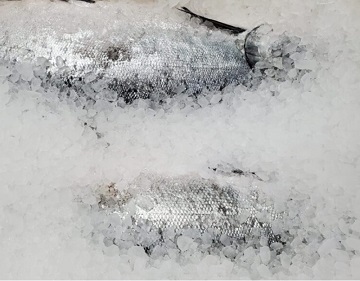
Alaska trollers will feel pain and unnecessary hardship from ruling on orca lawsuit
As president of Seafood Producers Cooperative, representing nearly 400 fishermen-owners, who reside in California, Oregon, Washington and Alaska, I want to convey our great disappointment and frustration with the recent ruling concerning the Wild Fish Conservancy and their lawsuit directed at our Salmon Troll fleet. The WFC found a technicality in National Oceanic and Atmospheric Administration’s biological opinion for troll-caught king salmon. No other fishing gear groups are being attacked and other commercial and sports fishermen in the region – and in the Puget Sound – will continue to harvest king salmon. >click to read< 08:59
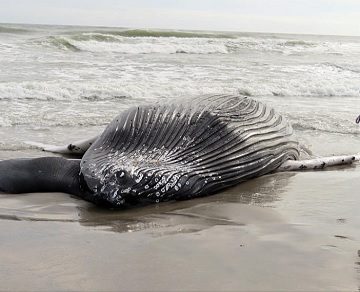
Wind farms creating ‘death zone’ at sea says ex-Greenpeace boss
Drilling foundations for offshore wind turbines and sound pulses used to prepare for the 900-foot towers may be creating a “death zone” for whales, a former Greenpeace chief claims. Patrick Moore, a co-founder of Greenpeace and its ex-president in Canada, believes the acoustic systems used by vessels surveying the ocean floor harm the marine mammals’ sense of hearing, risking their crucial ability to navigate, and leading to more dead whales washing up onshore. At least 36 “large” whales have washed up along the East Coast since Dec. 1, according to data from the National Oceanic and Atmospheric Administration. photos, >click to read< 07:51
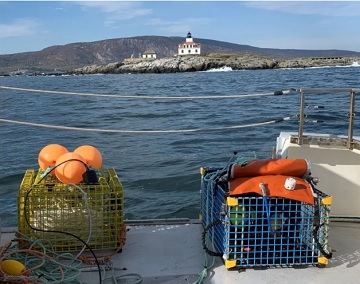
Hope vs. rope: Can technology save the whales, and Maine’s lobster industry, too?
Along the coasts of Massachusetts and Rhode Island, scientists, engineers, and fishermen are working feverishly to develop a new, high-tech way to harvest lobster – and the result could be the key to the survival of both the U.S. lobster fishery and the imperiled North Atlantic right whale. But farther north in Maine, the epicenter of the fishery, it’s unusually quiet. Only one Maine business is working on the technology, and only a handful of Maine lobstermen will test it. Many won’t even discuss it. The ropeless part is being worked out, but another critical component – an interoperable, open platform to track gear – is far from ready. The new equipment also is, at least for now, prohibitively expensive. One lobsterman said it would cost him nearly $500,000 upfront. >click to read< 16:20
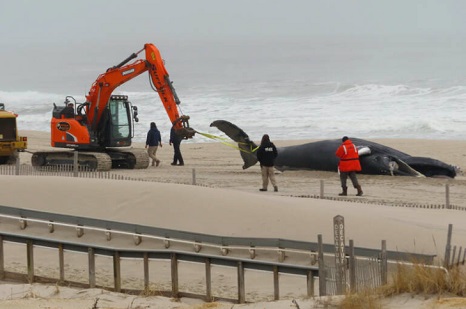
N.J. GOP seeks wind projects halt to see if whales benefit
Four state senators hosted a online hearing about offshore wind energy generation and whale deaths, three weeks after the most recent East Coast whale death was reported and despite the assurances of most scientists and conservationists that there is no correlation. The two-hour hearing came a week after Democrats, who control the Legislature and the governorship, held a similar hearing and many of New Jersey’s major environmental groups said the greatest danger to whales is climate change, not offshore wind generation. “I’ve been labeled a climate change denier and a tin-foil hat wearer,” said Jim Hutchinson, managing editor of The Fisherman,,, U.S. Rep. Frank Pallone Jr., who represents part of the Jersey Shore and who led last week’s Democratic-led forum, said pausing offshore wind projects wouldn’t prevent whale deaths. >click to read< 08:05

Celebrate Whale Week with NOAA Fisheries: A message from Janet Coit, Assistant Administrator
At NOAA Fisheries, our team of dedicated scientists and managers is responsible for the health and sustainability of more than 30 whale species in U.S and territorial waters. Every year, we spend a week taking a deeper dive to share our whale expertise. This year is particularly notable because it is the 50th anniversary of the Endangered Species Act. Some of the most recognizable whales—North Atlantic right whales, Southern Resident killer whales, and Cook Inlet belugas—are at the top of our Species in the Spotlight initiative. >click to read< 18:33
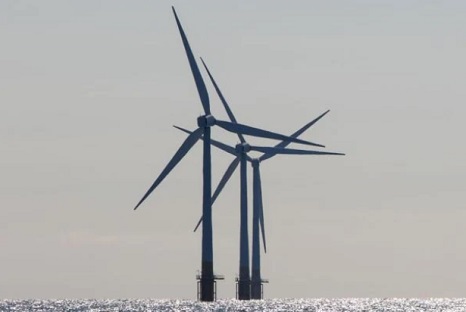
The New Green Activists Would Rather Save The Windmills Than Save The Whales
Save the whales. Once upon a time, that used to be the favorite mantra of environmental activists. Today, not so much. These days, it’s more chic to be into giant offshore wind turbines. And if dozens upon dozens of whales must be killed to make way for turbines along with their new mantra, “save the planet,” well, that’s just the price we must pay. Or so goes the current thinking among the green set. Scores of whale and dolphin carcasses have washed up along the East Coast in recent months, and particularly on New Jersey and New York-area beaches where no fewer than nine whales have washed ashore just since December. The evidence is not yet incontrovertible, but the deaths coincide with sonic testing in conjunction with massive wind turbine projects. >click to read< 08:28
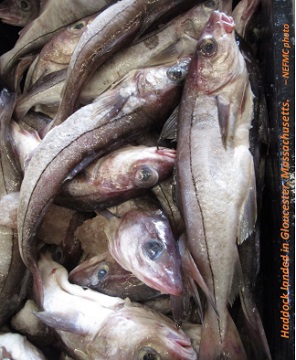
Fishermen: Haddock limits to lead to shutdown
In two tows during a fishing trip in March, Gloucester fisherman Joe Orlando caught what could have been almost his entire allocation for Gulf of Maine haddock under catch limits proposed for fishing year 2023, which begins May 1. Orlando harvested 7,000 pounds in those two tows, about a half day’s worth of fishing, Jackie Odell, executive director of the Northeast Seafood Coalition pointed out to members of the New England Fishery Management Council, NOAA Fisheries and others in an email. His allocation for the upcoming fishing year is expected to be 8,000 pounds. >click to read< 07:57
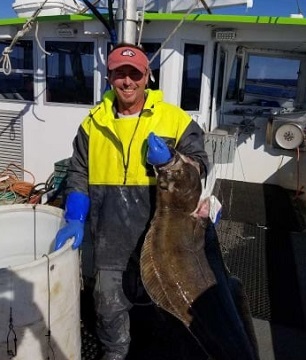
‘Enough is enough’: Midcoast lobsterman decries regulations to protect whales
Jason Lord, a second-generation Midcoast said he understands the effort to save critically endangered North Atlantic right whales. The problem, he contends, is lawmakers, government agencies and conservation groups have it wrong by targeting the Maine lobster industry, which has been forced to use breakaway trap lines and observe a seasonal no-fishing zone to protect the whales. “I’ve never seen a right whale off the coast of Maine,” said Lord, 50, who has been in the industry for 30 years. An Arizona congressman recently proposed a bill that could lead to further regulations like ropeless lobster traps. Last week, Maine Lobstering Union Local 207 Executive Liaison and Political Director Virginia Olsen testified against the bill on Capitol Hill. >click to read< 18:23
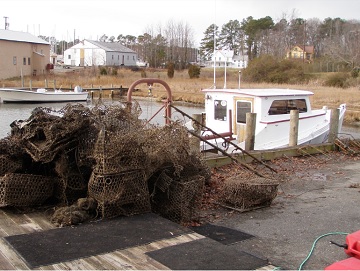
VIMS to lead national program for managing derelict fishing gear
The National Oceanic and Atmospheric Administration has recommended William & Mary’s Virginia Institute of Marine Science as home base for a new national program focused on protecting U.S. coastal waters from derelict fishing gear. The $8 million provided by NOAA to implement the four-year program is the largest single grant award in VIMS’ 83-year history. Many of these dollars will be passed on to program partners through an annual grant competition. Formally known as the Nationwide Fishing TRAP Program — “TRAP” for Trap Removal, Assessment & Prevention — the effort includes funding for commercial and tribal fishers to remove derelict pots from Virginia’s waters. >click to read< 17:46

NEFMC Requests Emergency Action for Gulf of Maine Haddock to Prevent Significant Fishery Impacts
The New England Fishery Management Council is asking NOAA Fisheries to take emergency action under the Secretary of Commerce’s authority to address a critical Gulf of Maine haddock situation that is expected to result in significant fishery impacts during the 2023 groundfish fishing year. The crux of the problem is this. Fishermen have been encountering Gulf of Maine haddock at very high catch rates. The proposed 2023 annual catch limit (ACL), however, is extremely low. The Council recently learned of one industry member who, in a single trip, harvested an amount of Gulf of Maine haddock equivalent to what will become his entire allocation for 2023. Several fishermen expressed concern that an early shutdown of the fishery was highly likely and would have wide-ranging impacts. >click to read< 15:43
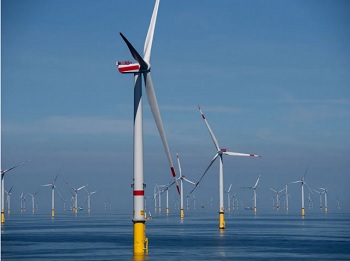
Congressman Van Drew: National Security is the Price We Will Pay
On April 17, Congressman Van Drew issued the following statement after the Pentagon sounded the alarms on how the development of offshore wind farms will affect our national security. “During my field hearing in South Jersey last month, my colleagues and I highlighted the adverse effects offshore wind development would have on various sectors and industries, from our environment to our national security, “said Congressman Van Drew. “These warnings can no longer be ignored. This President and this administration continue to disregard these valid concerns,,, >click to read< 08:06

Catch size a hot topic at Zone B meeting
A declining stock, looming federal rules to protect right whales and the court fights against them, how required gear and reporting changes will be paid for — Zone B lobstermen had a lot of industry news to talk about April 12 at Mount Desert Island High School. Discussion centered mainly on newly proposed minimum (and maximum) legal catch sizes to bolster the lobster stock. “I’ve heard at all council meetings, it’s not if you act, it’s when you act,” said Patrick Keliher, commissioner of the Maine Department of Marine Resources. “It’s almost like no one is taking into account what we’re seeing,” Zone B Council Vice Chairman James Hanscom said. “As an industry, we’re handling a lot of lobsters.” Several lobstermen and council members at the meeting had attended a March ASMFC meeting in Ellsworth and were familiar with proposed management measures that would increase the minimum legal size for landed lobster. >click to read< 16:20
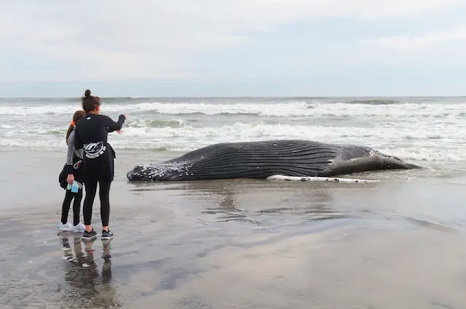
‘License To Kill’ Whales, Dolphins Handed to Offshore Wind Power Companies in Biden’s Green Energy Push
Greenpeace launched its “Save the Whales” campaign on April 27, 1975. But in the ensuing years, Greenpeace has gone full Orwell. Greenpeace is no longer interested in saving the whales. It may actually be aiding and abetting the Biden administration and the offshore wind industry in killing whales supposedly to “save the planet.” The deaths are coincident, however, with an increase in activity by the offshore wind industry as it surveys locations to erect its turbines. As it turns out, the federal agency has actually issued permits to the offshore wind industry to kill whales, dolphins and even seals. And not just one or two members of the species. >click to read< 09:11
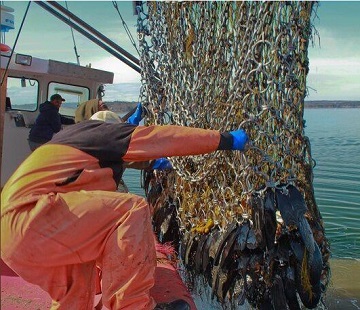
Scallop season winds down
As the state’s commercial scallop season winds to a close, federal regulators on April 1 decreased the amount that draggers can land in 2023 in the Northern Gulf of Maine by 25,000 pounds. Total landings for the NGOM for 2023 are 434,311 pounds, the National Oceanic and Atmospheric Administration (NOAA) announced March 31 as part of its overall NGOM Management Plan for 2023. Vessels are limited to possessing 1,666 pounds of in-shell scallops. NOAA had closed the NGOM scallop fishery on May 26, 2022, when its quota had been landed, effective through March 31 of this year, with Maine and Massachusetts vessels exempted if they were exclusively fishing in state waters. >click to read< 16:28
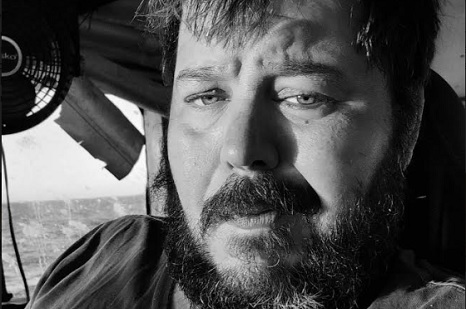
LEEMAN: Federal Regulators And Climate Alarmists Are Killing America’s Oldest, Most Iconic Industry
American fishermen are the most regulated in the world, and it’s driving experienced captains off the water and young people away from their homes in search of opportunities elsewhere. At 41, I’m one of the younger fishing boat captains in New England. I’m grateful Senator Susan Collins, R-Maine, met with me last week to discuss helping fishermen get a seat at the table with regulators. We who work the water, the same waters our families worked for generations, now find ourselves at the mercy of the “Faucis of fishing” — self-assured bureaucrats who sit behind desks with no sense of the harm they’re causing. >click to read< 07:53
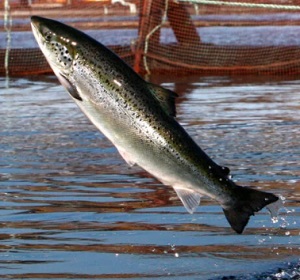
1st ocean fish farm proposed for East Coast off New England
A New Hampshire group wants to be the first to bring offshore fish farming to the waters off New England by raising salmon and trout in open-ocean pens miles from land, but critics fear the plan could harm the environment. The vast majority of U.S. aquaculture, the practice of raising and harvesting fish in controlled settings, takes place in coastal waters or on land, in tanks and ponds. But New Hampshire-based Blue Water Fisheries wants to place 40 submersible fish pens in water about 7.5 miles (12 kilometers) off Newburyport, Massachusetts, on two sites that total nearly a square mile, according to federal documents. >click to read< 09:03
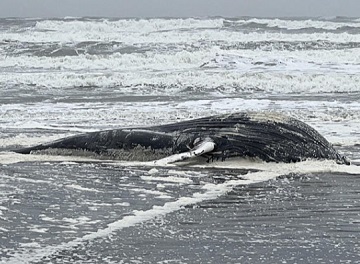
Ignoring dead whales, NOAA proposes another site survey off New Jersey
“Damn the whales, full speed ahead” seems to be the offshore wind policy of Biden’s NOAA. They now propose to approve yet another site survey, just 10 miles off Atlantic City. These surveys are the top suspect for the recent wave of dead whales, centered on New Jersey. The site is a big one because the offshore wind project is huge. Phase 1 is a whopping 1,500 MW, which means over 100 monster turbine towers. The survey area is around 1,500,000 acres or an incredible 2,300 square miles. Ironically the project is called Atlantic Shores, which is where all the dead whales are washing up. More deeply, the Atlantic Shores Wind Project has yet to be approved and may never be. Hugely disruptive site surveys should not be authorized until the Project is approved. >click to read< 13:57
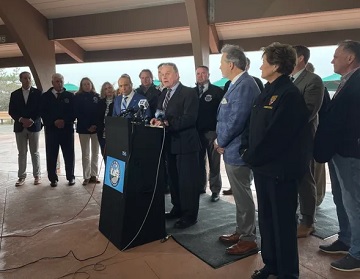
‘Tell us why’: Monmouth Commissioners call for investigation into surge of whale deaths
Monmouth County officials stood in the mist at Seven Presidents Oceanfront Park on Wednesday, where they gathered to call for an immediate stop to offshore wind energy work off New Jersey’s coast. Their announcement marked a new addition to a growing group of elected officials who are demanding answers on recent deaths among whales and dolphins across the region, and who allege offshore wind survey work is the cause. As of Wednesday afternoon, 10 whale deaths had been recorded along the Jersey Shore since Dec. 1. In addition, two separate pods of dolphins had stranded since early February on New Jersey beaches. Another three individual dead dolphins and one porpoise had washed ashore in separate strandings. >click to read< 16:47
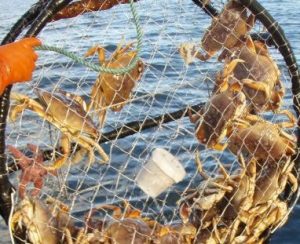
For Whales and Crabbers, Finding Balance Is Getting Harder
In Dick Ogg’s 25 years of commercial fishing, he’s had a few close encounters with whales—mostly while pulling Dungeness crab pots off the ocean floor. “I’ve had whales right next to me,” within about five meters, says Ogg. “They follow me, they watch, they’re curious. And then they go on about their business.” Ogg is fortunate his interactions have been so leisurely. For nearly a decade, California’s whales and crabbers have been locked in a persistent struggle. From 1985 to 2014, the National Oceanic and Atmospheric Administration (NOAA) reported an average of 10 whales were entangled in fishing gear each year along the west coast of the United States. >click to read< 07:53
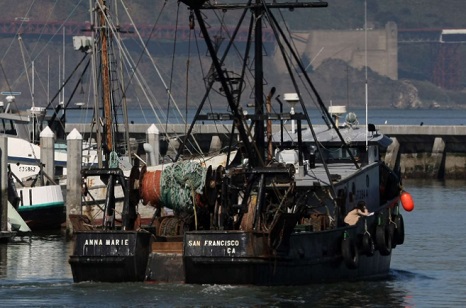
Oregon Fishing Industry Fed Up With Agency ‘Ignoring’ Their Offshore Wind Concerns
The West Coast Seafood Processors Association, the Midwater Trawlers Cooperative and the Oregon Dungeness Crab Commission claim their concerns about proposed offshore wind project call areas, areas where the agency is seeking public comment, and their impact on key fish populations due to the turbines’ electromagnetic field (EMF) cables, have been ignored by BOEM. They also worry about the impact offshore winds would have on their businesses and the entire state’s economy. “BOEM has told us that if Oregon doesn’t want this, they will back off and pursue other offshore wind areas, and we’ve made it pretty clear to them that Oregon doesn’t want this, and they’re still pushing forward,” Lori Steele, executive director of the seafood trade group West Coast Seafood Processors Association, told the DCNF. “They are giving us nothing but lip service,” she added. >click to read< 09:43
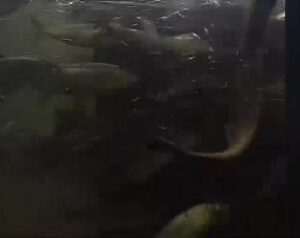
Environmental groups withdraw lawsuit over last Maine salmon
A coalition of environmental groups said Monday it is withdrawing a lawsuit against a renewable energy giant that it has accused of jeopardizing the last remaining wild Atlantic salmon in the U.S. The groups sued Brookfield Renewable, claiming the company kills salmon on the Kennebec River with its dams. Atlantic salmon only return to a handful of U.S. rivers, all in Maine, and they are protected under the Endangered Species Act. The conservationists were dealt a setback last month when the federal government ruled the salmon can coexist with hydroelectric dams on the Kennebec, as long as upgrades are eventually made to allow salmon to pass through the dams more easily. >click to read< 12:15






